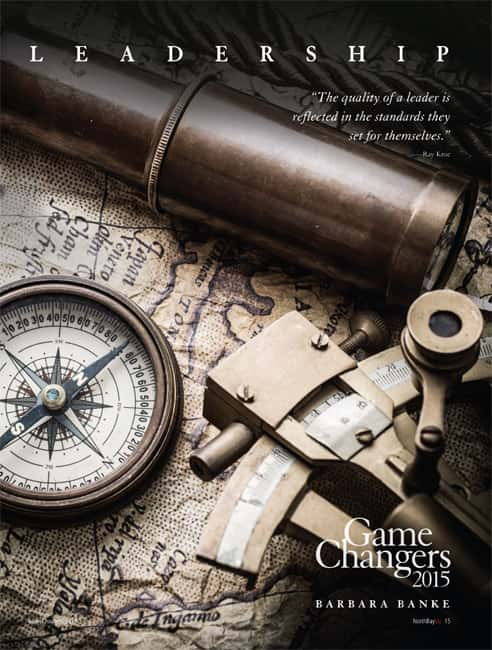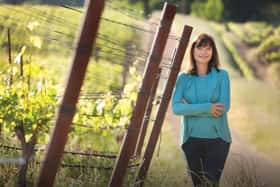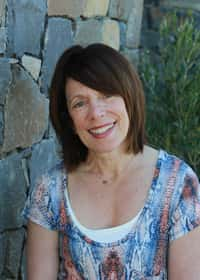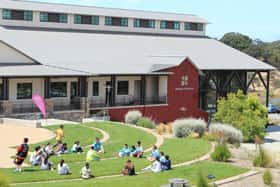“The quality of a leader is reflected in the standards they set for themselves.” —Ray Kroc
 When the British government designed its now-ubiquitous “Keep Calm and Carry On” poster prior to the start of World War II, it must have had Barbara Banke in mind—even down to the royal crown.
When the British government designed its now-ubiquitous “Keep Calm and Carry On” poster prior to the start of World War II, it must have had Barbara Banke in mind—even down to the royal crown.Dubbed “Queen of the Vine” by Fortune magazine, which lists her among the World’s Most Powerful Women, Banke, chairman and proprietor of Jackson Family Wines, is the epitome of calm in the diverse worlds of wine and horse racing. And as she leads Jackson Family Wines to new heights while preparing to eventually turn over its reins to the next generation, the widow of Jess Jackson (one of the wine industry’s most charismatic figures) is proof-positive that, despite great loss, one can—and must—carry on.
After Jackson died in the spring of 2011 from cancer, Banke assumed control of the company she had co-managed with him for more than 20 years, an outgrowth of the original Kendall-Jackson Winery that Jess had started in the early 1980s. Banke had always been a major influence in the evolution of Jackson Family Wines but usually worked more behind the scenes, leaving the job of being the “face of the company” to her tall, outspoken and flamboyant husband. Many in the wine industry were curious how Banke, known for her quiet nature, would carry the torch after his passing.
We now know the answer: Quite well, thank you.
Jackson Family Wines (JFW) is now the largest seller of “premium” wines (those that retail for $15 or more) in the United States. With Banke at the helm, the company has gone on a buying spree, snapping up vineyards and land not only in California, but also in Oregon and Australia. Its office space on Aviation Boulevard in northwest Santa Rosa will soon expand to three buildings. And the horse racing bug that snagged Jess’ imagination—and a good deal of his money, as well—now has a new benefactress.
And that shy, quiet, refined lady who was always sort of lurking in the background? Well, we’re all finding out what many who’ve worked with her over the years had always known: She’s a game changer who gets things done.

The beginning
Barbara Banke was born in Southern California in the 1950s, the era of Eisenhower Prosperity. Her mother was a homemaker and her father was an engineer who found work in the SoCal aerospace industry just as America began its quest to reach the moon. The Bankes made some investments in small apartment buildings and put their kids to work on weekends to help with maintenance. Young Barbara quickly developed an affinity for real estate—a precursor to what would later define her chosen career.
While most young girls back then dreamed of becoming teachers and nurses, Banke had other ideas.
“From the age of 13 on, I always wanted to be a lawyer. I really don’t know why,” she muses, “but it could be because I read a lot of murder mysteries and I watched a lot of Perry Mason on TV.”
Then again, “I also love to argue,” she says.
After earning an undergraduate degree at UCLA, Banke headed north to San Francisco, where she attended the University of California Hastings College of Law. Her forte? Real estate. After graduation, she ran a law practice that specialized in land use cases. Moving in the city’s legal circles, Banke eventually met Jess Jackson, a high-powered attorney from a competing firm. In time, she became his law partner, and then his life partner. They married in 1984.
In 1986, the couple and their daughter, Katherine (Katie), set up house in Tiburon. Both parents continued to practice law in San Francisco, but Jackson was already seriously eyeing a second career as a winemaker as his Kendall-Jackson Vintner’s Reserve Chardonnay, first released in 1983, was showing considerable market success. Jackson would eventually leave law in 1987, but Banke continued her practice until 1990. In 1992, the family, which now included two more children, Julia and Christopher, packed up and moved to Sonoma County permanently to focus on the wine business. The rest, as they say, is history.
Horsing around
Banke says in 2003, she noticed Jess was becoming a micromanager in the wine business, “so I asked him, ‘Why don’t you get a hobby?’”
At the time, Banke was consumed with multiple projects—the JFW business, the kids and her work with starting private schools (see “Sonoma Academy,” below). But she felt Jess needed something else to release pent-up energy. He decided to go back to horse racing, one of first loves (in the 1960s, his uncle owned a breeding operation in Hemet, Calif., and Jess helped him).
“So he bought a racehorse. Then, pretty soon, he bought another…and another,” she laughs. Their first few years in the industry were rough. Horse traders working with Jackson were unscrupulous, defrauding him of more than $3 million. The couple filed a lawsuit, which settled out of court just one week before the trial was to begin. “We recovered all the money,” Banke says.
It all came to light when Banke went to Lexington, Ky., to make sure a breeding operation Jess had purchased closed escrow. Kickbacks were discovered, the management team was released, “and things got better. We won Horse of the Year in 2007, 2008 and 2009, which is unheard of when someone has been in the business less than five years,” Banke says.
Those who thought Banke might not saddle up to the horse racing business were wrong. Her Stonestreet Stables’ Carpe Diem ran in the Kentucky Derby this spring, but Banke pulled him from the Belmont Stakes in June after she discovered “something was bugging him.”
“He was about 90 percent himself, and there’s no way I’d run a horse at 90 percent,” she asserts. Like everything she does, it has to be an effort of 100 percent.
Personal time
When she finds time to get away from all her business interests and daily demands, Banke tends to keep her personal time private, although she shares a daily 90-minute walk with her friend and neighbor, Peggy Furth, near her mountainside home in Geyserville. She told Fortune magazine’s Jon Birger that her morning trek “clears my mind.”
“I love hiking, I love reading, and I love travel. Except I travel so much now that it’s almost not fun anymore. I love my [Labrador retrievers], my horses and my kids. And I love real estate and finding vineyards,” she says.
She’s also cherishing the arrival of her first two grandchildren this summer. Daughter, Katie, is expecting a baby boy in August, and son, Christopher, welcomed his first child, also a boy, in June.
The entire family is very much involved in the business. Katie is the head of government relations and runs the JFW sustainability program, which is near and dear to Banke’s heart. Daughter Julia is in marketing, and Christopher, who’s finishing up his juris doctorate at UC Berkeley’s Boalt Law School, is learning the ins and outs of sales.
In her personal life, Banke is most proud of her children. “They survived having me as a mother and still turned out to be happy, nice human beings,” she laughs.
Professionally, she’s all about the fine wines JFW produces and the horse company and its achievements.
 Still waters run deep
Still waters run deep
Just about every writer who interviews Banke comes away with the same observation: She’s quiet, fairly soft-spoken and a bit of an introvert. But still waters run deep.
“She’s quiet, yet a subtle and determined leader,” says Janet Durgin, head of school at Sonoma Academy, the independent college prep high school that Banke and several other North Bay community leaders founded in 2000. The school opened its doors to its first students just days before the terrorist attacks on September 11, 2001.
Durgin has known Banke for 15 years now. While Banke no longer is on the Academy’s Board of Trustees (her daughter, Katie, is a current trustee), Durgin well remembers many meetings with Banke.
“You watch her and, when she’s thinking, she’ll twirl her hair around her finger. She’ll look down and you can just tell she’s cogitating. Then you’ll hear a low chuckle, followed by a short guffaw,” Durgin says. Then Banke will share her thoughts.
“She leads with passion and commitment. And people want to be on board because she makes things happen,” Durgin explains. “She isn’t a micromanager. She likes to work with good people and support them to do their best work.”
Durgin has copied Banke’s style in her approach to hiring and managing at Sonoma Academy. “I’ve been lucky to work with her, because her support has let me hire others, then step back and let those excellent people do their work. The results are extraordinary.”
It’s important to note that, although Banke is, by nature, quiet, “quiet shouldn’t be confused with passive,” Durgin says. “She’s focused and determined.”
Banke’s real estate acumen is another asset, Durgin says. Not only is she adept at finding fine vineyard land (JFW has invested more than $100 million in vineyard purchases since Banke took over), she also was instrumental in securing the land that’s now the campus for Sonoma Academy.
As for her own evaluation of her leadership style, Banke echoes Durgin’s assessment.
“I’d describe myself as collaborative; I try to listen to ideas. I try to get [employees] to produce ideas, because we have a lot of extremely talented people in this company—everything from winemaking, law, finance, marketing. A lot of them have a lot to offer and I want to bring out the best in them,” she explains.
“I’m not a one-woman show. I’m certainly not a winemaker. I can’t make a 100-point wine, but there are people in this company who can—and do! I’m a resource manager. I furnish the raw materials and the money. And I see if we can achieve what we want to achieve, which is to make the best wines in the world.”
And she does it with finesse, just keeping calm and carrying on.
Sonoma Academy
 It can be said that Barbara Banke has many passions and multiple irons in the fire, but one that consistently comes to the forefront is her devotion to improving educational opportunities. Through her leadership, Sonoma County now has two of the finest private schools in California, Sonoma Country Day (elementary and middle school) located near the Sonoma County Airport, and Sonoma Academy (a college prep high school) at the base of Taylor Mountain in southeast Santa Rosa.
It can be said that Barbara Banke has many passions and multiple irons in the fire, but one that consistently comes to the forefront is her devotion to improving educational opportunities. Through her leadership, Sonoma County now has two of the finest private schools in California, Sonoma Country Day (elementary and middle school) located near the Sonoma County Airport, and Sonoma Academy (a college prep high school) at the base of Taylor Mountain in southeast Santa Rosa.While Banke, a product of public education, was a founding trustee of both institutions, it’s Sonoma Academy that’s truly her legacy, for it was she who led the search for the 34-acre parcel at the base of Taylor Mountain that became the school’s permanent campus. And it was Banke and her husband, Jess Jackson, who purchased the parcel and donated it to the school.
“She and Jess purchased this priceless land,” says Janet Durgin, Sonoma Academy Head of School. “It was an amazing find at the cusp of the 21st century—34 acres connected to open space. To have Taylor Mountain’s natural history at our doorstep, letting students study flora and fauna, is just wonderful. One end of our campus is wild open space protected in perpetuity. Yet the other end is less than half a mile from big box stores (Costco, Office Depot, Target and Best Buy, among others). It provides a compelling lesson to students: How do we manage growth in a community?” Durgin asks. “How do we protect precious open space and still have a viable economy. How do we make sure there are opportunities for all?”
Sonoma Academy started with 45 students in September 2001. Next year, it will draw 285 students form more than 30 cities across Sonoma, Napa and Marin counites, with 50 percent receiving financial aid. Many of the buildings are named for major donors and, just this spring, Jackson and Banke got due recognition when the Jackson Banke Amphitheater was formally dedicated on the campus. The family selected the amphitheater for dedication because “it’s such a nice spot with a beautiful view,” Banke says. “We wanted something to honor Jess.”
Durgin credits Banke’s “incredible nose for land” and her ability to “sniff it out,” but Banke shares the credit with North Bay realtor Ken Marshall, her scout. The goal was to find a property in a country setting with available city services. Marshall found a spot zoned for 65 homes, which was owned by real estate developer Art Candiotti. Candiotti sold the property to Banke and Jackson. They, in turn, donated it to the school.
When Durgin was interviewing for the Sonoma Academy Head of School post, Banke decided to show her the land. It led to an interesting exchange that revealed quite a bit about Banke’s down-to-earth love of the land and approach to business—literally.
“Barbara drove me up to this land before there was any development in the neighborhood,” Durgin says. “All that was here was remains of a dairy farm, cows and a bull. I was in my interview suit. Barbara and I got out of the car and she asked if I wanted to walk to the top. I looked down at my shoes—heels—and said, ‘I’d love to, but….’
“So she pulled out a pair of dirty old boots from her car. I put them on and we walked to the top. I was amazed. Here was this hard-working, driven, sophisticated businesswoman, with dirty old boots ready and waiting in her car. It was then I realized just how much of a farmer Barbara really is.”
Philanthropy
Barbara Banke is well known for her philanthropy. In addition to support for Sonoma Country Day School and Sonoma Academy, she and the Jackson family committed $4 million to found the Jess S. Jackson Sustainable Winery Building at UC Davis. In addition, Barbara and her family contributed $500,000 to help launch the Family Justice Center Sonoma County, which provides help to victims of domestic violence. She’s also global ambassador for the Susan G. Komen Breast Cancer Foundation.
Professionally, Barbara is a member of the Advisory Board at Keeneland Association, Inc., and The Jockey Club. She also serves on the boards of the Breeders’ Cup, the National Racing Museum Hall of Fame and the Belmont Child Care Center.
New Ventures
 Barbara Banke has never been one to rest on her laurels, no matter how many. Her interest in sustainability and recycling led her and Peggy Furth to start WholeVine Products (also called Sonomaceuticals), which turns leftover grape pomace (seeds, skins) into culinary oil, cookies, crackers and dry flour. The entire line of products is offered to consumers via its website, www.wholevine.com, and the company recently struck up a partnership with Novato-based Republic of Tea, which has launched a new line of iced teas (technically tisanes because the blends contain no black, green or white tea) using grape skins left over from the winemaking process.
Barbara Banke has never been one to rest on her laurels, no matter how many. Her interest in sustainability and recycling led her and Peggy Furth to start WholeVine Products (also called Sonomaceuticals), which turns leftover grape pomace (seeds, skins) into culinary oil, cookies, crackers and dry flour. The entire line of products is offered to consumers via its website, www.wholevine.com, and the company recently struck up a partnership with Novato-based Republic of Tea, which has launched a new line of iced teas (technically tisanes because the blends contain no black, green or white tea) using grape skins left over from the winemaking process.In May of this year, Jackson Family Wines announced it was collaborating with premium electric vehicle producer Tesla to install one of the first large-scale Tesla stationary energy storage systems across a number of its wineries. The energy storage solution smooths out spikes associated with refrigeration and cooling, lighting, compressed air and process water treatment—the parts of the winemaking process that use the most energy. While the installation will help JFW and Banke advance its energy strategy, which includes the purchase of renewable energy certificates, the generation of onsite solar electricity and energy storage, it also will save the company hundreds of thousands of dollars annually and contribute to its broader sustainability goals.



